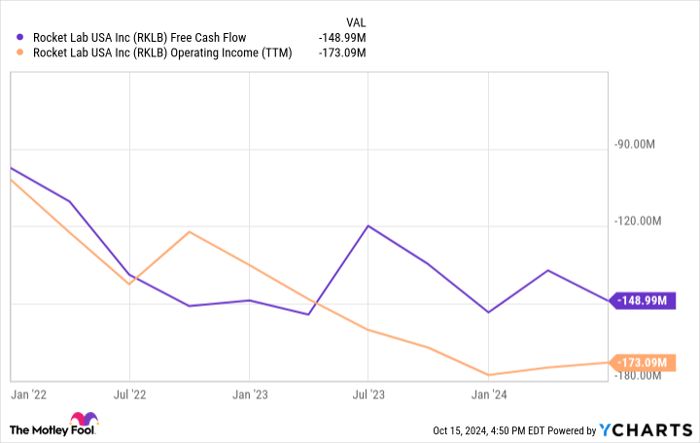An incredible feat happened last week. Private company SpaceX successfully launched and "caught" its 20-story Starship rocket as it returned to Earth, a key step in making its large rocket reusable and ready for human missions to the Moon and Mars.
Starship is the largest rocket ever put into development, with plans for a 150- to 250-ton payload once it starts commercial launches. The company plans to carry upward of 100 people on interplanetary missions. Sending dozens of people to space looked implausible 20 years ago. Now, with companies such as SpaceX, the space economy is on the verge of taking a great leap forward.
However, for investors, this poses a problem; SpaceX is a private company, which means you can't invest in its stock. So how does one invest in the space economy? There is one company nipping at SpaceX's heels that is publicly traded. Enter Rocket Lab (NASDAQ: RKLB). Here's why investors optimistic about the growth of the space economy should buy this stock and never sell.
Rocket Lab: On SpaceX's tail
Over a decade ago, SpaceX entered the commercial market for rocket launches through what is now known as the midsize vehicle. This is the company's workhorse today, the Falcon 9 rocket. In order to find customers to steal away from SpaceX, Rocket Lab went even smaller with its first rocket, called the Electron. This nimble rocket -- used by the U.S. government and commercial satellite providers -- has started growing its launch rate quickly and is now growing faster than Falcon 9 in its sixth year after first launching.
In its second-quarter report, Rocket Lab noted that it has signed 17 new launches for Electron just this year, which amounts to $141 million in total contract value. The company's backlog is now over $1 billion, which is many times larger than its trailing annual revenue of $327 million. A large backlog gives Rocket Lab predictability and allows it to invest heavily ahead of upcoming projects.
Diversifying revenue streams
Rocket Lab has hit a good starting point with the Electron rocket, but it isn't stopping here. Management has much larger ambitions to become a vertically integrated space company. Within rocket launches, it is building a much larger system called the Neutron. The Neutron is in development right now and comes with a more than 10x increase in payload, which correlates with revenue earned per launch. This can expand Rocket Lab's launch capabilities and lock in its loyal customers.
Outside of just launching, Rocket Lab has built and acquired technology for space systems, such as the actual vehicle that houses the payload and solar cells for electricity generation while in orbit. In fact, today the majority of Rocket Lab's revenue comes from the space systems segment. However, all of this is enabled by the fact that Rocket Lab is the only other company besides SpaceX to consistently launch rockets into space for commercial customers.
In the long term, Rocket Lab is planning to add a third pillar to its business model: space data and services. This could be a way to sell data from satellites or even provide satellite internet for third parties, similar to Amazon's Project Kuiper. There are few details on what the product offerings will actually be, though.
RKLB Free Cash Flow data by YCharts
Is the stock a buy?
Valuing the stock of Rocket Lab is a bit tricky. It isn't generating much in revenue today and is highly unprofitable, burning close to $150 million in free cash flow every year. It will likely not be profitable until the Neutron rocket becomes fully operational. There are a lot of risks along the way, given how dangerous the rocket launch business can be. Concerns such as these could make a cautious investor stay away from the stock.
There is quite a lot of upside if the company can execute on its vision, though. At a market capitalization of $4.94 billion, Rocket Lab is traded at a severe discount to SpaceX, which is rumored to be valued at around $200 billion. It has nowhere near the capabilities of SpaceX today but is definitely in second place in the commercial space race.
I wouldn't be surprised if the company is generating over $10 billion in revenue in 10 years if it can keep growing its rocket launch, space systems, and data and software services. That would still be a small sliver of the space economy, which is valued at more than $500 billion.
From my seat, this upside makes Rocket Lab a buy-and-hold stock at current prices. It may be a multi-decade story, but the stock has a ton of upside if you are bullish on the growth of the space economy.
Don’t miss this second chance at a potentially lucrative opportunity
Ever feel like you missed the boat in buying the most successful stocks? Then you’ll want to hear this.
On rare occasions, our expert team of analysts issues a “Double Down” stock recommendation for companies that they think are about to pop. If you’re worried you’ve already missed your chance to invest, now is the best time to buy before it’s too late. And the numbers speak for themselves:
- Amazon: if you invested $1,000 when we doubled down in 2010, you’d have $21,121!*
- Apple: if you invested $1,000 when we doubled down in 2008, you’d have $43,917!*
- Netflix: if you invested $1,000 when we doubled down in 2004, you’d have $370,844!*
Right now, we’re issuing “Double Down” alerts for three incredible companies, and there may not be another chance like this anytime soon.
*Stock Advisor returns as of October 14, 2024
Brett Schafer has no position in any of the stocks mentioned. The Motley Fool recommends Rocket Lab USA. The Motley Fool has a disclosure policy.
The views and opinions expressed herein are the views and opinions of the author and do not necessarily reflect those of Nasdaq, Inc.



